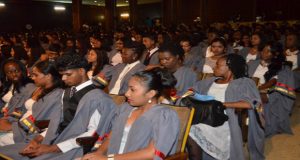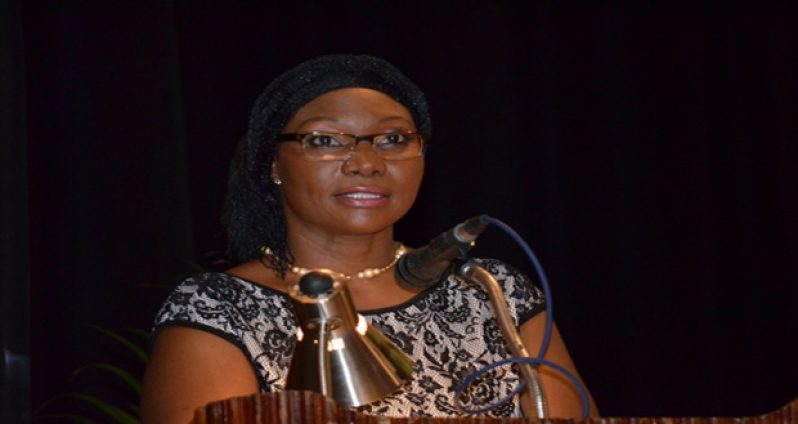THE Cyril Potter College of Education (CPCE) last Thursday graduated 506 teachers, but only 12 per cent of the graduating class was males. The low number, however, reflected an increase from the nine per cent who graduated last year.
Of the 506 who graduated, 104 were trained in Early Childhood Education, 196 in Primary Education, 192 in Secondary Education and 14 as Technical Instructors.
Additionally, 24 per cent of those teachers were trained in English; 18 per cent in Mathematics; 14 per cent in Pure Sciences, and 13 per cent in Agricultural Science.
Art Education, Spanish, Industrial Technology and Home Economics each recorded less than five per cent of the graduates.
Delivering her report at the 81st graduation ceremony, CPCE Principal Viola Rowe said the college has recorded tremendous successes.

She pointed out that during the period September 2014 to August 2015, the college experienced significant successes under the Guyana Improving Teacher Education Project (GITEP), particularly in the area of Human Resource Development.
During this period, lecturers completed intensive training programmes in pedagogical practices in critical areas such as Mathematics, Science, Multi-Grade Teaching, Teaching of Reading and Writing, Guidance and Counselling, English as a Second Language, and Special Education Needs, Rowe said.
TRAINING
“Ten staff members completed studies at the master’s level, while nine members continued to pursue their programme of study. With the exception of one staff member, who received a scholarship made possible by the Government of India, all other staff members received Government of Guyana scholarships through the Guyana Improving Teacher Education Project,” Rowe disclosed.
Significantly, she said, CPCE was able to extend its teacher training access by an additional four satellite centres, set up at Kwakwani, Kamarang, Moraikobai and Charity; bringing the total number of active satellite centres to 17.
These new centres complement those at Mabaruma, Moruca, Port Kaituma, Anna Regina, Vreed-en-Hoop, Georgetown, New Amsterdam, Rose Hall Town, Bartica, Mahdia, Annai, Lethem and Linden.
CPCE will soon take the requisite steps to extend the Trained Teacher’s Certificate (TTC) Programme and the Teacher Upgrading Programme (TUP) in areas where those are most needed, such as Kato and Paramakatoi in Region 8; and Skeldon, Upper Corentyne, Berbice in Region 6, she revealed.
Moreover, a plan of action will be designed to attract students to enrichment-skill areas such as Art Education, Music Education, Information Technology, Physical Education and Modern Languages, she said.
The one-year-long Associate Degree in Education (ADE) programme will also be reviewed to accommodate instructors from Business and Science departments of technical institutes and practical instruction centres, and university graduates who are in the schools as untrained teachers, Principal Rowe disclosed.
“Our current Special Education Needs’ (SEN) offering will also be reviewed to make it applicable to the needs of our students. We envision, therefore, adopting the mainstreaming approach in the delivery of teacher education and training for students with special needs.
“Additionally, we project to design short courses to equip in-school assistant teachers of SENs with basic methodologies peculiar to their area of work and interest,” she added.
CHALLENGES
Rowe nevertheless revealed that recruitment of part-time staff with the right mix of skills to supervise distance students on their in-school practicum attachment remains a major challenge for the college.
In an effort to reduce the impact of such a shortage, she said, a decision was taken to have full-time staff facilitate the process, thereby allowing students to achieve the required number of contact hours under quality supervision.
“We also found it challenging to recruit qualified and experienced staff to facilitate the areas of Physical Education, Music Education, and Information and Communication Technology (ICT),” Rowe said. As a result, she said, CPCE was unable to offer those disciplines as specialisation. However, all students benefited from general course offerings in those areas.
By Svetlana Marshall



.jpg)










